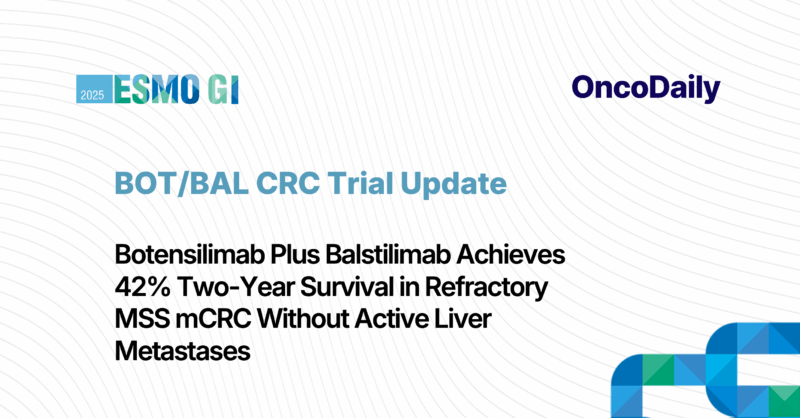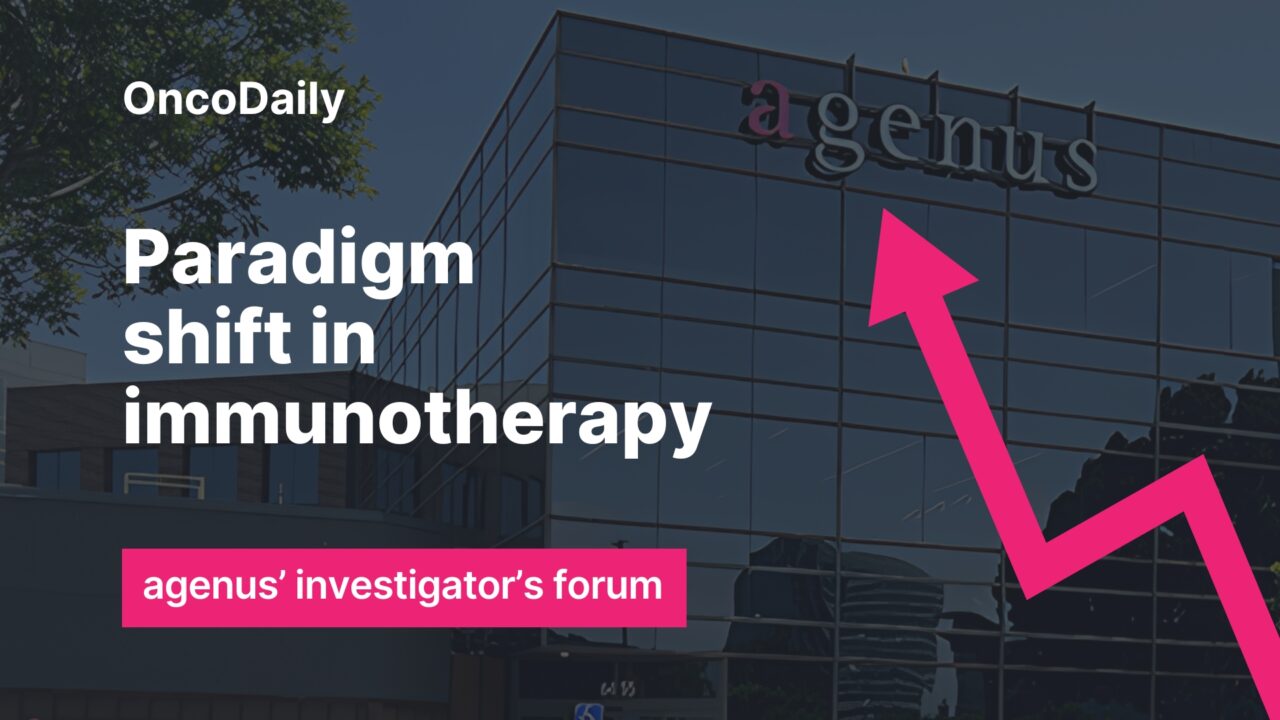Agenus, a leading immuno-oncology company immune-driven therapies for cancer, presented new data at the at the ESMO GI 2025 meeting, which took place in Barcelona, Spain, July 2-5.
The updated results from an expanded cohort (n=123) of heavily pretreated patients with microsatellite-stable metastatic colorectal cancer (MSS mCRC) treated with botensilimab (BOT) plus balstilimab (BAL) reflected around 40% increase in patients and firmly confirms the durability and survival benefits of the combination:
- Objective Response Rate (ORR): 20%
- Median Duration of Response (DOR): 16.6 months
- Disease Control Rate (DCR): 69%
- Median Overall Survival (OS): 20.9 months
- 2-Year Survival Rate: 42% overall; 43% in 4th-line+ setting (n=37)
These results are unprecedented in this immunotherapy-resistant, late-line population, where historical OS has been only 5–8 months.
Safety: No new safety signals; immune-related events were manageable, and no treatment-related deaths were reported.
Dr. Benjamin Schlechter (Dana-Farber) and Dr. Steven O’Day (Agenus CMO) emphasized the potential paradigm shift this chemo-free IO combination may bring to refractory MSS CRC, citing survival plateaus rarely seen outside highly immunogenic tumors.
Botensilimab and Balstilimab Show Durable Survival in MSS Colorectal Cancer: ESMO GI 2025 Update

End-of-Phase 2 (EoP2) meeting
This presentation was preceded by the July 1, 2025 End-of-Phase 2 (EoP2) meeting, where the FDA acknowledged balstilimab’s contribution to the BOT/BAL combination, allowing Agenus to proceed to Phase 3 without a BOT monotherapy arm.
The agency also aligned with Agenus on the design of the global registrational trial (BATTMAN, launching Q4 2025).
While the FDA recommended a randomized trial for full approval, Agenus maintains that the magnitude and durability of the data meet Subpart E standards due to the urgent unmet need in this population. Agenus plans to pursue multiple expedited pathways to accelerate access to this chemo-free treatment option for refractory MSS mCRC patients, highlighted by Jennifer Buell, Ph.D., Executive Chairwoman of Agenus.
An additional exclusive look inside Agenus’ Investigator’s Forum: BOT/BAL Advancing Immunotherapy in Solid Tumors.
Cochaired by Dr Richard Goldberg, Chief Development Officer at Agenus and Prof. Michel Ducreux, Head of the Digestive Cancer Committee at Gustave Roussy, along with Prof. Eric Van Cutsem, Medical Director and Co-Founder of Digestive Cancers Europe, around two-hour meeting had experts in GI oncology discussing both existing and unreleased data and its applications in the clinical setting for colorectal cancer. Investigators who presented during the meeting include Dr Garo Armen, Dr Steven O’Day, Dr Joseph Grossman, Dr Ben Schlechter, Dr Nick DeVito, Dr Pashtoon Kasi, Prof Myriam Chalabi.
Dr Garo Armen welcomed the attendees to the meeting honoring the courage of young investigators for taking the spotlight of the pioneering work. The meeting evolved around the notion of “pure immunotherapy” showing exceptional results in MSS colorectal cancer, reminding the panel the “immunotherapy experience with melanoma”.
Highlighting the unique attributes of botensilimab, Dr Ben Schlechter answered the common question of how it is different than other CTLA-4 inhibitors:
“It is definitely different. Active in both advanced and refractory disease, this drug has favorable safety profile due to its modified structure. And not only does it have the potential to save the late-stage disease population who are dying with current standards but also offers a great chance to spare aggressive treatment approach for in early stages.”
From the flat lines of complete response rates in NEST and UNICORN trials after ONLY 1-2 doses of neoadjuvant BOT/BAL, to increasing response rates twice by giving it more time instead of adding an additional dose, the most used phrase during the meeting was “paradigm shift”.
Adding on the firm results in the neoadjuvant setting for no-liver met mCRC, Dr Steven O’Day emphasized:
“…the intact tumor with its affected lymph nodes is where you want to best educate your T cells, allowing prevention of distant mets and sparing organs“.
New data from Agenus’ pipeline will be coming out later this year so stay tuned with OncoDaily to be updated by the lates advancements in immunotherapy and colorectal cancer.
Agenus Bets Big on Botensilimab

About the C-800-01 Phase 1 Study
The C-800-01 Phase 1, open-label, multicenter trial (NCT03860272) evaluated botensilimab alone or in combination with balstilimab across multiple solid tumors, including an expansion cohort in microsatellite stable metastatic colorectal cancer. In the MSS CRC cohort, patients received botensilimab (1 or 2 mg/kg every six weeks) plus balstilimab (3 mg/kg every two weeks) for up to two years.
The study enrolled heavily pretreated patients, including those with no active liver metastases, and assessed safety, objective response rate, progression-free survival, and overall survival. No maximum tolerated dose was reached, and the safety profile was manageable across dose levels. The trial also included exploratory biomarker analyses to inform potential predictors of response. Preliminary findings from this study in refractory MSS CRC were published in Nature Medicine in September 2024.
About Agenus
Agenus is a leading immuno-oncology company targeting cancer with a comprehensive pipeline of immune-driven therapies. Founded in 1994, the company’s mission is to expand the patient populations benefiting from cancer immunotherapy through innovative combination approaches.
Agenus’ portfolio includes a broad repertoire of antibody therapeutics, adoptive cell therapies (via its affiliate MiNK Therapeutics), and adjuvants (via SaponiQx). The company has end-to-end capabilities spanning research, discovery, and GMP manufacturing, and it has a global clinical development footprint.
Agenus is headquartered in Lexington, MA. For more information, visit www.agenusbio.com or follow @agenus_bio on social media. Important information for investors will be routinely posted on the company’s website and social channels.
About Botensilimab (BOT)
Botensilimab (AGEN1181) is a novel, multifunctional, Fc-enhanced CTLA-4 antibody engineered to boost both innate and adaptive anti-tumor immune responses. Its unique design aims to overcome the limitations of first-generation CTLA-4 inhibitors (like ipilimumab) and extend immunotherapy benefits to “cold” tumors that typically respond poorly or not at all to standard immune checkpoint blockade.
Botensilimab’s Fc-enhanced structure allows it to robustly engage activating Fc receptors on key immune cells, thereby priming and activating T cells, depleting immunosuppressive regulatory T cells in the tumor microenvironment, activating myeloid cells, and inducing long-term immune memory. Through these mechanisms, botensilimab has demonstrated the ability to ignite immune responses across a range of solid tumors, including those resistant to conventional PD-1 or CTLA-4 therapies.
To date, approximately 1,200 patients have been treated with botensilimab and/or balstilimab in Phase 1 and 2 trials. Botensilimab alone or in combination with Agenus’ investigational PD-1 antibody balstilimab has shown clinical responses in nine different metastatic cancers in late-line settings. For more information on ongoing botensilimab trials, please visit www.clinicaltrials.gov.
About Balstilimab (BAL)
Balstilimab (AGEN2034) is a novel, fully human monoclonal IgG4 antibody that blocks PD-1 (programmed cell death-1) from interacting with its ligands PD-L1 and PD-L2. By inhibiting the PD-1 checkpoint pathway, balstilimab aims to restore T-cell activity against tumors.
It has been evaluated in over 900 patients to date and has demonstrated clinical activity with a favorable tolerability profile in several tumor types. Balstilimab is being studied both as a monotherapy and in combination with other agents (such as botensilimab) to expand its therapeutic impact.


